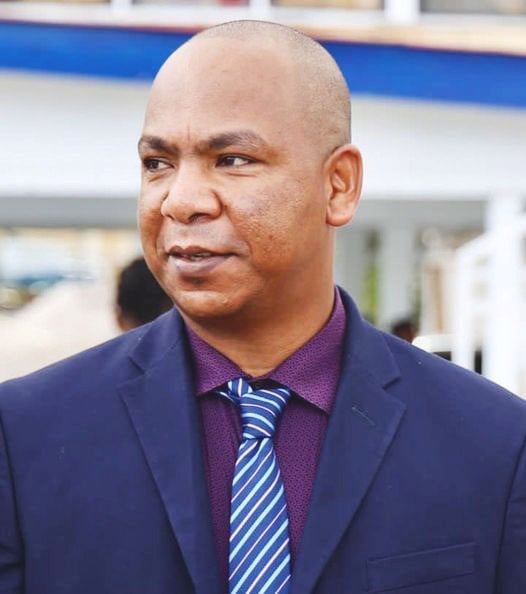In view of the revelation by Assistant Commissioner of Police Calvin Brutus that he received over $46 million in wedding and Christ-mas presents, former speaker of the National Assembly Ralph Ramkarran yesterday recommended that there should be a law that precludes government em-ployees and parliamentarians from accepting gifts.
“… There has to be [law] because it will continue. In modern societies they can’t even take a plane ticket. I am not saying we should mirror that, but there have to be rules and enforcement of those,” he told Stabroek News yesterday.
Ramkaran pointed to the United Kingdom’s Gift and Hospitality Policy. He said that this outlines its Civil Service Code which states that civil servants must not accept gifts or hospitality or receive other benefits from anyone which might reasonably be seen to compromise their personal judgement or integrity. “… Public servants across the board must follow the rules and not engage in private business and [there is] a rule against the acceptance of gifts by public servants including parliamentarians that is public and has an enforcement mechanism that is subject to public scrutiny,” he said.
Here, Ramkarran said, while there is a Public Service Rules Book, Police Standing Orders and the Police Discipline Act there is no enforcement.
Winston Felix, a former commissioner of police, also said that there are guidelines. He, too, pointed to the Standing Orders and Police Discipline Act but noted that the culture here is one where police officers accept gifts and do not report them. “It is explicit in not collecting gifts, but you know here what happens. Police and everyone collect and I keep meh mouth shut and you keep you mouth shut,” he said.
In his weekly Conversa-tion Tree column, Ramkaran wrote about his father, a government minister in both 1957 and 1961, who had received Christmas gifts which he returned. “On this latter occasion I distinctly recall that in December, 1961, a large number of Christmas gifts were delivered to our home. I vaguely remember the decision that the gifts were not opened. They were stored in our verandah. Sometime later, but before Christmas, the gifts were returned unopened. Again vaguely, I recall discussion to the effect that government ministers were not allowed to receive gifts,” he wrote.
“The PPP built a legacy of ethical administration during its two governments from 1957 to 1964. Of course, there were accusations of corruption, but these were few and far between, were never proved and never gained traction. The PPP’s history of clean government together with the modest lifestyle of PPP leaders between 1964 and 1992, as opposed to that of opposing politicians, entrenched modesty and incorruptibility in administration as part of its character.”
He said that enabled the PPP, in the election campaign for the 1992 elections, to credibly propose as part of its manifesto to establish a “lean and clean” administration. This slogan resonated because the electorate believed it and were fed-up with the corruption of the past.
Ramkarran believes that poverty led to declining standards of ethics in an effort for survival, “increasing corruption as public servants and business people scrambled to survive.”
The leadership of the new PPP/Civic administration then also resisted calls for legal methods to curb existing corruption and establish ethics in administration, he related, although Cheddi Jagan did his part to curb the scourge.
“Government leaders, particularly Cheddi Jagan, relied on their own integrity as an example that would be followed. But this did not happen. While Cheddi Jagan was alive, corruption seeped into the government for which he was forced to take action. But apart from the Auditor General completing the missing reports and constituting the Integrity Com-mission to which officials are required to submit asset statements annually, nothing further was done,” he said.
“Calls from within the PPP for additional steps to be taken to tackle corruption were met with such vicious hostility that all such discussion has been silenced,” he added.
Ramkarran said that today, public servants “can openly accumulate close to a billion dollars in cash and assets under the noses of their employers without any sanction whatsoever. It would be challenging the boundaries of credulity to accept that no one knew of the accumulation while it was going on. And if people knew, or permitted it, then no argument can be credibly advanced that this kind of activity is not tolerated. Private business activities by certain public servants or certain categories of public servants, and unlawful accumulation by a large swath of the new ruling strata is now rampant.”
Government officials, he said are also “not necessarily complicit in this state of affairs but there is no explanation for the failure to enforce existing rules such as public servants not engaging in business activities period, or to devise and impose standards of ethical behaviour generally and especially about receiving gifts with enforcement mechanisms.”
The Integrity Commis-sion, he noted, was limited to assets declaration. That act, he said, should be tightened to allow for investigations, such as those done by the Financial Intelligence Unit (FIU) and where found suspicious could lead to police and further investigations. “Why are the commissioners of the Integrity Commission maintained in a toothless position without the ability to investigate submissions and call in the police?” he questioned.
The Public Procurement Commission also came in for criticism over its limited ambit.
“The Procurement Com-mission recently reported in relation to a matter that even though it found that systems were violated it had no power to do anything. Is there any intention to alter this situation by giving the Procurement Commission additional powers or is it, like the Integrity Commission, to also remain a ‘toothless poodle?’” Ramkarran questioned.
He said that the argument about corruption in 2012 in which he was involved, was that increas-ed government spending on infrastructure from $2 billion to $20 billion had opened the way for increased misconduct and additional steps needed to be taken to curb what many felt were increasing instances of corruption.
“At this time the Procurement Commission had already been entrenched in the Constitution since 2001. The PPP/C government adamantly refused to appoint the commission on flimsy excuses that its appointment would deprive the government of ‘no objection.’ It was the APNU+AFC government that appointed the commission,” he wrote.
“Apart from the appointment of the Procurement Commission in about 2016, the position that prevailed in 2012 remains the same today save that government expenditure has multiplied – the total budget in 2023 is $1.14 trillion! Since the potential for corruption has increased exponentially, the minimum that ought to be expected is basic reforms arising from recent events,” he added.
And while he spelt out recommendations and showed where the loopholes were, Ramkarran said that he did not believe that the current PPP/C government would listen.
“Regrettably, history has shown that no PPP/C government will willingly embark on even these minimal and basic reforms to deal with corruption based on public statements within Guyana. It is a sad reality that the only way even these reforms can be expected is if pressure of a condign, as opposed to an exhortatory nature, is imposed from external agencies,” the former longtime executive member of PPP/C said.








